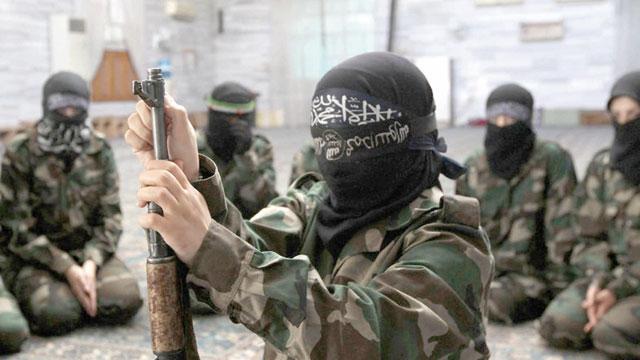You are here
'People do not only join terror groups out of despair'
By Camille Dupire - Mar 29,2018 - Last updated at Apr 02,2018

A member of an extremist battalion assembles a rifle during military training in a mosque in Aleppo in 2014 (Reuters file photo)
AMMAN — Despite the Daesh terror group's military retreat in the Arab region, many of the drivers that pushed individuals to join the violent extremist group have not been addressed, leading ultra-radical groups to adjust their recruitment techniques accordingly, a recent report by the West Asia-North Africa (WANA) Institute showed.
While most Preventing and Countering Violent Extremism (P/CVE) efforts have focused on the symptoms of radicalisation, few have tried to address the root grievances that encourage vulnerable and marginalised individuals to turn to violent extremism, said researcher at WANA Alethea Osborne.
Driven by an ideal
Although socio-economic frustrations are often cited as the main drivers for radicalisation, they cannot alone explain the attraction towards violent extremism, the report underscored.
“Since violent extremist groups offer a new worldview and purpose, they can be seen as an opportunity by these individuals,” Osborne told The Jordan Times.
She warned against the widespread idea that people joining extremist groups are doing so only out of despair. “For many young people, the feeling of ‘having been let down’ by the state which ‘does not meet their needs’ is a more important driver to enrolling in such groups,” she claimed, noting that “despite exerting their best efforts in achieving a certain status, some of these youth feel like they will never be able to reach a certain position as they do not have the connections needed by a system ruled by nepotist tendencies.”
Osborne stressed the importance to understand the nuances involved in such allegiances to extremist groups. “It is not only because someone is poor that they will join a terrorist group; instead, they will see it as an opportunity that will bring them more economic and social gains, in addition to providing them with a purpose.”
In the UN’s 2018 World Happiness Report published earlier this month, Jordanians were shown to be “less happy” than in the previous years, ranking 90th out of 156 nations.
Austerity measures fueling growing frustrations
However, socio-economic frustrations such as price hikes, unemployment, nepotism, government inefficiencies and lack of political representation do play a great part in leading individuals to violent extremism, the researcher explained.
For Hussein Khuzai, professor of sociology at Balqa Applied University, Jordan’s 16-place drop in the UN report can largely be attributed to socio-economic reasons including high rates of unemployment among the youth, price and tax hikes, rise in crime rates, in addition to Amman being classified among the top most expensive Arab cities.
Since the introduction of several price hikes and austerity measures by the government in February 2018, Jordanians have voiced an increasing sentiment of resentment towards the authorities.
A number of protests have spread across the country, denouncing the dangers looming from such decisions.
A protester who took part in a demonstration calling for the dissolution of the Parliament, Zeyad Jibril, said: “The government’s policies make people hungry... More than half of the people live under the poverty line and the rise of these prices will result in crimes, and many other problems.”
The government has refuted such claims and the 2018 draft state budget included, for the first time, a social safety network/cash subsidy with a value of JD171 million to make up for rising cost of living brought by lifting subsidies on bread and other commodities.
According to Osborne, “a quiet majority of the population is close to breaking point as a result of the increased living costs, high unemployment rates, and economic stagnation”.
“It is especially prevalent in areas outside of the capital, where most individuals feel like they have been marginalised from the development process which is [perceived to be exclusive to]…. the capital,” she continued.
Focus on human security measures
Highlighting the intricacy of the reasons accounting for such allegiances, Osborne pointed to the need to reconceptualise the human security paradigm to increase the resilience of marginalised groups and help communities resist the appeals of violent extremism in the future
“Focusing on tight security measures including arrests, curfews and so on will not help in solving the grassroots factors causing this phenomenon. Instead, it is crucial to understand the context-specific triggers and develop softer approaches such as civic engagement and the establishment of youth centres, where vulnerable people will have a space to cultivate critical thinking and out-of-the-box attitudes,” the researcher explained, noting that this will help them in developing inventive economic opportunities.
She suggested that more focus should be put on rehabilitation programmes for returnees in order to learn more about the reasons that pushed them to join these violent groups.
“This will help in drafting the best policies to mitigate the rise of a new generation of fighters,” she explained, noting that Jordan counted one of the highest numbers of foreign fighters in terms of per capita in the past, along with Tunisia and Saudi Arabia.
“Ultimately, it is impossible to say x plus y equals terrorist and we need to keep in mind that radicalisation is a process which cannot be tackled by an arrest which just comes at the end of the process. Instead, policies need to identify and tackle the roots,” Osborne said.
Related Articles
AMMAN — Women can be an invaluable source of community information, and play a role in countering violent extremism in society, a recent stu
AMMAN — Terrorist groups have proven to be resilient and adaptive to counterterrorism efforts, experts said on Tuesday.Over the past two dec
AMMAN — The West Asia North Africa (WANA) Institute, under the umbrella of the “Strong Cities Network in Lebanon and Jordan”, is condu















